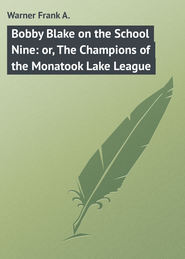По всем вопросам обращайтесь на: info@litportal.ru
(©) 2003-2024.
✖
Bobby Blake on a Plantation: or, Lost in the Great Swamp
Автор
Год написания книги
2017
Настройки чтения
Размер шрифта
Высота строк
Поля
“So am I,” agreed Lee, “but he’ll be on duty again this evening, and if we get a chance we can look him up then.”
After lunch the three friends went on deck again. The sea by this time was quite calm, and the boys strolled over to the port side and, leaning on the rail, gazed idly out over the broad expanse of waters.
Suddenly the lads heard a shrill yell and a heavy splash alongside the ship. One of the mess boys, a young negro, had been sitting carelessly on the rail not far from where the boys were standing, when a sudden lurch of the vessel had thrown him off his balance and he had made a clean dive overboard.
For a second the boys were stunned by the unexpectedness of the accident. Then Bobby whipped out his jacknife, cut loose a life preserver that Fred was trying to loosen, and tossed it to the struggling negro in the water. He judged his distance so accurately that the buoy landed within a foot or two of the unfortunate darkey, who with a desperate struggle caught hold of it.
Meanwhile, Fred and Lee were shouting “man overboard,” and the cry, passed from mouth to mouth, reached the bridge. The engine room telegraph rang “stop” and then “full speed astern.” Almost before the big ship had come to a shuddering standstill, a boat had been lowered, and in short time they had the gasping darkey boy aboard.
“Mah Lan’ Sakes!” he sputtered, “Ah don’t known who-all threw me dat life p’server, but whoevah did saved mah life, Ah reckon, an I’se shuah enough grateful.”
“Well, who was it threw you the preserver, and how in time did you come to fall overboard and make us all this trouble?” inquired the mate, who in his official capacity thought more of the time lost than of the narrow escape from death the little darkey had had.
“Ah cain’t say, suh, jes huccome I to fall ovahboahd,” said the little darkey. “Seems like Ah don’t nevah go to git me a little rest on dis yeah ship but whut somethin’ happens. Ole ship jes gives a roll an’ heaves me clean ovah de side. Ah ain’t sure who give me dat life p’server, but seems like they was three fellers standin’ by the rail, and one of ’em done heave it out at me so it pretty near lands plumb aroun’ mah neck.”
“Yes, but don’t you know who it was?” persisted the mate.
“Well, suh, seems to me it was one of them,” pointing to where Bobby, Fred and Lee were standing, “but Ah couldn’t rightly say which one.”
“Was it one of you?” inquired the mate, turning to them.
“Well,” said Bobby, “I guess I’ll have to plead guilty. We heard him splash overboard, and luckily there was a life preserver right near us, so I threw it over to him.”
“It was rather lucky for young ’Rastus here,” commented the officer. “Your name is ’Rastus, isn’t it?” addressing the little darkey.
“Yessuh, dat’s part of it,” returned ’Rastus, with a grin that seemed to show every tooth he possessed.
“What’s the rest of it?” inquired Bobby.
“Mah full name am ’Rastus Abimilech Belshazzar Johnson,” said the little negro, evidently taking no small pride in this pretentious title.
“It’s a wonder we’re still afloat with a name like that aboard,” exclaimed Mr. Parr, the mate. “But you’d better get down below, ’Rastus, and get some dry clothes on.”
“Ah sho’ craves to git me some dry duds,” said ’Rastus. “An’ furdermo’, ’fore Ah goes Ah wants t’ thank, yuh, white boy, for heavin’ me dat cork doughnut de way yuh did. Ah’d be confabulatin’ wid de little fishes down at de bottom of de ocean if yuh hadn’t.”
“Oh, that’s all right,” said Bobby. “Next time you’d better be sure you’ve got a good toe-hold before you decorate the rail.”
“Yessuh,” said ’Rastus, meekly, and departed for the lower regions of the ship, leaving a wet trail on the white deck to mark his going.
The crowd of passengers that had assembled all wanted to shake hands with Bobby at once, and were inclined to make a hero of him, but nothing was further from that young gentleman’s mind, and as soon as possible the three friends made their escape.
“Whew!” exclaimed Bobby, mopping his face, “you’d have thought I had really done something, to listen to that crowd.”
“Well, I should say you have done something,” chuckled Lee. “You’ve saved the longest name I ever heard in my life from getting drowned, haven’t you?”
“Well, I guess that’s right enough,” laughed Bobby. “If I had known ’Rastus’ full name, I’d have slung him two life preservers, for fear one wouldn’t be able to float it.”
“It is a mighty big name for such a little rascal,” said Fred, “but he seemed grateful enough, Bobby. Maybe he’ll do you a good turn some day. You never can tell.”
CHAPTER XII
UNDER SUNNY SKIES
It was early one morning that the ship warped into her berth at New Orleans. The three friends were up bright and early, as they knew that the steamer would dock shortly after dawn, and they did not want to miss any of the excitement of the event. The big wharves were swarming with negro stevedores, who joked and sang good-naturedly as they shifted huge bales of cotton and boxes containing all manner of goods. Ships already at their docks, either loading or unloading, sent up puffs of steam as their cargo winches lifted huge nets full of barrels and boxes from the seemingly inexhaustible holds, or consigned them to the same place. Mule teams, horse teams, and big rumbling automobile trucks came and went, getting in each other’s way and giving rise to short but forceful arguments on the part of their drivers. In a word, all the varied bustle and activity of a large and busy port was spread out for the boys to view from their vantage point on the upper deck.
On the dock for which they were heading, a group of negro laborers was waiting for the vessel to be made fast, and suddenly one of them started a spirited “buck and wing” dance, the others singing, whistling, and keeping time by clapping their hands. As the ship crept up to the dock at a snail’s pace, many of the passengers crowded over to the starboard side, where the boys were standing, and when the perspiring dancer finally ended with a double shuffle and a bow, he was rewarded by a shower of coins that rained down from the side of the ship which was now being warped up to the dock and made fast.
“Some pep to that boy,” commented Fred. “You’d think they’d save their energy for the work ahead of them.”
“Oh, a negro always has time and energy for a little fun, no matter how hard he has to work,” replied Lee. “I’ve seen them dancing and cutting up after a long day of cotton picking, and that’s about as hard work as I know anything about.”
But there was no longer much time to spend on the deck, for now the gangplank had been shot out and the passengers were beginning to stream over it. This reminded the boys that they also had some strapping and bundling to do, and they rushed to their stateroom and got to work. In a few minutes all their packing had been done, and with warm good-bys to the officers and many of the passengers, with whom they had become favorites, they left the steamer.
“Seems like an old friend, already,” commented Bobby, as they walked along the pier. “I don’t wonder that sailors fall in love with their ships.”
“I suppose any place begins to seem like home after you’ve been there for a while,” replied Fred. “But as for me give me terra cotta every time.”
“Terra firma I suppose you mean,” laughed Lee.
“Let it go at that,” said Fred carelessly. “What’s one word more or less between friends?”
A stalwart young negro was lying on a bale of cotton, basking like a cat in the hot sun. The leader of a gang of roustabouts came hurrying along looking for men.
“Got a job for you, Sam,” he said. “This steamer’s got to be unloaded in a hurry. Come along now and I’ll put you in a gang.”
“Nothin’ doin, boss,” replied the negro with a yawn.
“Why, what’s the matter with you?” remonstrated his would be employer. “It was only yesterday you were striking me for a job.”
“Ya-as,” replied the other, as he yawned and turned over for another nap, “but dat war yesterday. Ah made two bits dis mornin’, an now Ah got money in mah pocket. Go ’way, man, an’ let me sleep.”
With a gesture of disgust the other hurried away to look for more likely material. The boys looked at each other and laughed.
“You see from that what we’re up against down here,” said Lee. “That’s the way most of them are. As long as they have money enough for their next meal, they’re perfectly satisfied. That man with a few cents in his pockets is as happy as if he were a millionaire.”
They had about two hours before it was time for their train to start, and as it was nearly noon, the first thing they did was to get a hearty meal. Then they spent a little while roaming about the beautiful and busy city, so different in many respects from what Bobby and Fred bad been accustomed to in the North. They were especially interested in viewing the spot where, behind cotton bales, Andrew Jackson and his men had held off the flower of the British Army and won the most notable victory of the war of 1812.
“It was great,” said Bobby, as he looked at his watch. “But hurry up, fellows. We’ll have to get a hustle on, or we’ll miss the train.”
But Lee did not seem especially alarmed.
“I guess we’ll have time enough,” he said. “The train we’re going to take doesn’t bother much about timetables. Still there’s no use in taking chances.”
His conjecture was correct, for although they got to the station on time, it was some time after the scheduled hour when the wheezy old engine pulled out of the depot. And after it got started it rambled on in a careless, happy-go-lucky way, as though it did not care much when it got to its destination.
It was a mixed freight and passenger train. There were perhaps a dozen freight cars, with one passenger coach attached to the end of the train. It ran along a single track, which was little more than “two streaks of rust and a right of way.”
Most of the stations at which the train stopped were small ones, but there were one or two of respectable size. When the train came to a halt at these, there were usually several negro women who walked along the side of the passenger car, offering their wares to the travelers. Their chief stock in trade was fried chicken, and this smelled so good that the boys bought repeatedly, until Fred at last declared that he’d be ashamed after that to look a chicken in the face.







